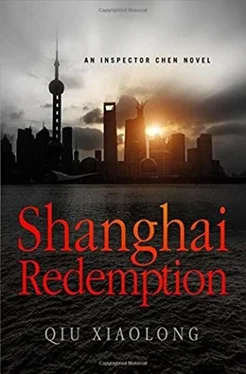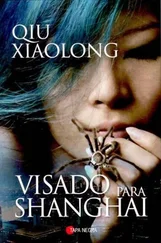“I understand. In last several years, Liang landed a number of enormously lucrative deals with the government, but his company didn’t have any special expertise or experience, compared to other companies-”
“That’s something I can’t discuss,” Dai said, cutting Yu off. “It was due to the reputation of the company, I suppose. Liang has always delivered on time and met the required specifications.”
“Also because of his connections, I would say.”
“Yes, his connections,” Dai said, leaning back in his chair. “For a successful businessman today, that’s not really surprising.”
“Liang’s company was selected, from all the competing companies, as the designated supplier for the high-speed train, and your law firm prepared all the documents for the bidding process. According to one post on the Internet, however, the company created a special memory drive for which they charged the Railway Ministry more than ten thousand yuan. It was discovered to be nothing more than an ordinary flash drive wrapped in a plastic shell-a flash drive that sells for only twenty yuan in any supermarket.”
“That decision was made by the Railway Ministry in Beijing. I’m not a technology professional, so I can’t tell you anything about it,” Dai said. “We helped them submit their bid, and all the necessary specifications were included and verified. Everything was legitimately done.”
“But if everything was legitimate, why did he flee?”
“That’s a question for the police, not us. As far as I can see, Liang simply panicked. The storm of accusations on the Internet was terrifying. It was like a lynch mob. His privacy was invaded, his personal life put out on display, and all his company’s secrets paraded before the public. Nobody could possibly withstand the pressure.”
It was clear that this conversation was going nowhere. Sighing inaudibly, Yu wondered whether Chen could have done any better.
“But there is one thing I can tell you. The company uses a well-known American accounting firm to audit its books. If you’re interested, talk to the accounting firm directly.”
Dai sat up in his leather swivel chair, his fingers touching a framed picture on the desk. It was a photo of a strikingly attractive woman.
“Our law firm has come a long way,” Dai said. “You might have seen pictures of our special advisor Kai in the newspapers. She no longer works in the office, but she founded it single-handedly.”
IN THE EARLY AFTERNOON, Chen decided to pay a visit to Suzhou Opera Club.
His hotel room felt oppressive; he couldn’t sit there any longer. And ever since his second phone call to Qian, he’d had an ominous feeling.
Qian might not be at the club, but maybe someone there could tell him something about her. At the very least, it could be an interesting visit, something he could talk about with Old Hunter. Chen’s knowledge of Suzhou opera had mostly come from his conversations with Old Hunter, but it wouldn’t be too difficult for him to toss out a couple of terms and names, pretending to be someone genuinely interested in opera.
The club was in a traditional two-story building, and a small sign on the front door indicated the club was on the second floor. The first floor had been converted into a shoe store, which had a large sign declaring “Suicidal Sale! Bankruptcy!” But the sign looked faded. It could have been posted there for weeks, possibly months.
Visitors to the club had to cut through an extremely narrow corridor leading to a precarious staircase in the back. On the second floor, the door was open, covered only by a bamboo bead curtain flapping slightly in an unexpected breeze. Chen noticed a bell on the doorframe, so, instead of barging in, he pressed the bell.
“Come on in. The door is open.”
A woman got up, walked over, and nodded her welcome. She was in her late thirties or early forties, looking haggard and noticeably thin in her oversized dark gray mandarin dress, like yesterday’s chrysanthemum.
The club’s space was quite large. It looked like it had been converted from the original living room and two wings with the partition walls removed. There were a couple of tables and chairs by the windows, instruments were leaning against the wall, and an oblong opera table stood toward the upper end. That was probably the centerpiece, and singers would perform sitting at the table.
There was also a small bouquet of jasmine flowers on the table.
Four or five kids were gathered in the center of the room, some playing pipa, some plugging sanxian, seemingly oblivious of his intrusion. He wondered whether there was a class going on at the moment.
“I’m staying at the Southern Garden Hotel. It’s so close, and I’m interested in Suzhou opera.” He decided not to ask about Qian straight off. “Do I have to pay a fee?”
“No, you don’t. This is not an opera house, and we don’t sell tickets. But if you want to buy a cup of tea, or a buy a CD, you are most welcome.”
“A cup of tea first,” he said, choosing a fairly expensive one, Hairy Point, for thirty yuan. “I’ve never been to a Suzhou opera club before.”
“It’s not like the club in your hotel, Southern Heavenly World, that much I can tell you. And I’m glad you’re interested in opera. By the way, my name is Nan.”
“No, I’m not interested in that kind of nightclub. And my name is Qiang,” Chen said, thinking of Qian again.
“Look around and enjoy yourself,” she said, pouring out a cup of tea for him. “If you have any questions, just ask. The kids will start singing soon.”
“Thanks.”
He seated himself on a mahogany chair by the windows. On the tea table, there was something like a menu, from which a visitor could choose songs or episodes, each with a price listed next to it. It wasn’t expensive at all. The mere fact that there was such a club at such a desirable location seemed nothing short of a miracle.
“I have a question for you, Nan. How do you manage to keep this club open?”
“Well, Suzhou opera enjoys a long tradition in this city. I grew up in a family of opera fans, listening to it all the time from my earliest memories on. When my parents passed away, they left these rooms to me. Alone, I didn’t need all that space, so I’ve converted it for the club after the opera theaters were all torn down in recent years. Like me, some other people were sad to see the local opera go into decline like that, so they help in whatever way possible. But it’s been really tough to keep the club going.”
“I imagine it’s not easy, maintaining this oasis in the midst of our materialistic society.”
“Usually, the members of the club meet to sing two or three times a week, and nonmembers come to listen and enjoy, buying a cup of tea or a CD as a sort of donation,” Nan said wistfully. “Suzhou opera is losing its audience, especially among young people. So we keep the place open for the kids to come by after school, and the instruments are left out so that the children can play them.”
“That’s something really worth doing,” Chen said, nodding. People came here to the club because of their passion for the traditional art, despite all the entertainment available on TV and the Internet. “Not everyone knows how to appreciate a slow pace. Describing Suzhou opera, a friend always used the well-known example of the one that features a young girl walking downstairs, lost in an internal monologue; it can take as many as eighteen episodes for her to reach the last step.”
“Yes, that’s from the Pearl Pagoda . You can see why times are really hard for Suzhou opera, with its narratives unfolding so slowly in a society that moves so fast,” she said with a wan smile. “In the evening, we’ll have an informal performance of short pieces. It’s free, and anybody may come. Of course, you may want to buy another cup of tea. We won’t refuse any donations from people who love Suzhou opera.”
Читать дальше












